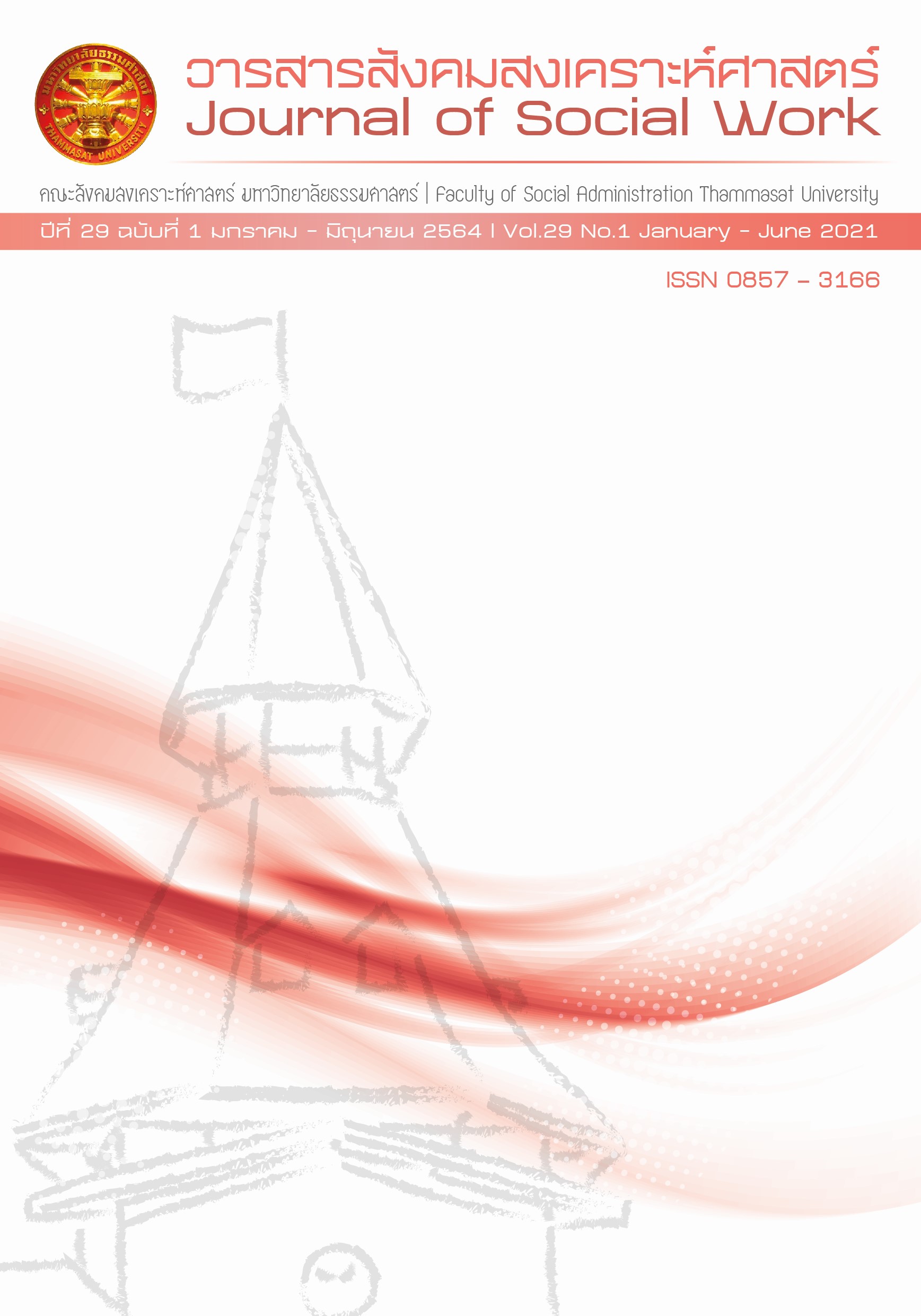Roles of Social Workers in Social Support for Breast Cancer Patients
Keywords:
Roles of Social Workers, Social support, Breast cancer patientsAbstract
The aim of this research is to study the roles of social workers on social support for breast cancer patients. The research uses the qualitative method through semi-structured interview sessions with 8 social workers, who have been working closely with breast cancer patients, from 6 cancer hospitals nationwide.
The research suggests that these social workers provide 3 aspects of social support for the breast cancer patients, which are emotional and mental support, instrumental support, and information support. The social support is divided into 3 periods: pre-treatment, during treatment, and post-treatment thus enable the patients to accept their symptoms, agree to continuously undergo the treatment and eventually live better lives. The roles of the social workers include the role of a consultant, the role of an educator, the role of an influencer and a rehabilitator, and the role of a coordinator with interdisciplinary teams in providing emotional and mental support to the patients. The other roles include cooperating with the instrumental support of social workers concerns resource coordination, educating and providing information to the patients, and coordinating with other teams to support the patients in terms of news and information. The major suggestion from this research is that there should be policies and roles on the social support within associate networks and interdisciplinary teams and add the role of a case manager for individual social workers to support the patients and their families
References
กรมสุขภาพจิต. (2561). BDMS แนะตรวจเต้านมด้วยตนเอง คัดกรองเบื้องต้นได้, 12 มิถุนายน 2561 จาก https://dmh.go.th/news-dmh/view.asp?id=27795
กนกนุช ชื่นเลิศสกุล. (2541). ประสบการณ์ชีวิตสตรีไทยที่ป่วยเป็นมะเร็งเต้านม. (วิทยานิพนธ์ปริญญาพยาบาลศาสตรดุษฎีบัณฑิต). มหาวิทยาลัยมหิดล, คณะพยาบาลศาสตร์. กรุงเทพฯ.
จิณพิชญ์ชา มะมม. (2551). ความก้าวหน้าในการดูแลรักษาผู้ป่วยเต้านม. วารสารสภาการพยาบาล. 23(2), 11-24.
ฐิติวัฒน์ ขัตติ. (2559). แนวทางการพัฒนาคุณภาพชีวิตผู้ป่วยมะเร็ง ตำบลบ้านฝาย อำเภอน้ำปาด จังหวัดอุตรดิตถ์. วารสารสำนักงานป้องกัน และควบคุมโรคที่ 10, 14(2), 45-54.
พรพรรณ วนวโรดม. (2552). ความต้องการด้านจิตใจของผู้ป่วยมะเร็ง และความต้องการการสนับสนุนด้านจิตใจจากพยาบาล.โครงการประชุมวิชาการ ประจำปี 2552 ฝ่ายการพยาบาลโรงพยาบาลศิริราช. กรุงเทพฯ.
มาลัย มุตตารักษ์. (2553). Breast Imaging and Intervention. (พิมพ์ครั้งที่2). เชียงใหม่: เวียงพิงค์การพิมพ์.
สุพรรณี โต๊ะกลาง. 2555. การศึกษาผู้ป่วยมะเร็งเต้านมที่เห็นคุณค่าในตนเอง. (สารนิพนธ์ปริญญามหาบัณฑิต). มหาวิทยาลัยศรีนครทรวิโรฒ, สาขาวิชาจิตวิทยาการแนะแนว. กรุงเทพฯ.
สุภาพร จงประกอบกิจ. 2551. ความเครียด การเผชิญความเครียด และแรงสนับสนุนทางสังคมของผู้ป่วยมะเร็งลำไส้ใหญ่ที่ได้รับยาเคมีบำบัด. วิทยานิพนธ์ปริญญาพยาบาลศาสตร์มหาบัณฑิต, สาขาวิชาการพยาบาลผู้ใหญ่, คณะพยาบาลศาสตร์, มหาวิทยาลัยมหิดล. กรุงเทพฯ.
สุภางค์ จันทวานิช. (2552). การวิเคราะห์ข้อมูลในการวิจัยเชิงคุณภาพ. (พิมพ์ครั้งที่ 9). กรุงเทพมหานคร : สำนักพิมพ์แห่งจุฬาลงกรณ์มหาวิทยาลัย.
องอาจ นัยพัฒน์. (2551). วิธีวิทยาการวิจัยเชิงปริมาณและเชิงคุณภาพทางพฤติกรรมศาสตร์และสังคมศาสตร์. (พิมพ์ครั้งที่ 3). กรุงเทพมหานคร: สามลดา.
อนุรีย์ ตันสกุล. (2527). งานสังคมสงเคราะห์ทางการแพทย์กับผู้ป่วยโรคมะเร็ง. กรุงเทพฯ: ไพศาลศิลป์การพิมพ์.
อุมาภรณ์ ไพศาลสุทธิเดช. (2540). การดูแลผู้ป่วยภายหลังผ่าตัดเต้านมที่บ้าน และการบริหารร่างกายหลังการผ่าตัดเต้านมที่บ้าน, ในชนิตา มณีวรรณ (บรรณาธิการ.), คู่มือการปฏิบัติการพยาบาลที่บ้าน. กรุงเทพฯ: บรรณศิลป์ พริ้นติ้ง.
อภิญญา เวชยชัย. (2562). การจัดการรายกรณีในการปฏิบัติงานคุ้มครองเด็ก. กรุงเทพฯ: สมาคมนักสังคมสงเคราะห์แห่งประเทศไทย.
อรุณี อ่อนสวัสดิ์. (2551). ระเบียบวิธีวิจัย. (พิมพ์ครั้งที่ 3). ภาควิชาการศึกษา คณะศึกษาศาสตร์ มหาวิทยาลัยนเรศวร.
Cobb, S. (1976). Social Support as a Moderator of Life Stress. Psychosomatic Medicine, 38(5), 300-312
Ebright, P.R. & Lyon,B. (2009). Understanding hope and factors that enhance hope in women with breast cancer. Oncology Nursing Forum, 29(3), 561-568
International Agency for Research on Cancer is part of the World Health Organization. (2018). Latest global cancer data: burden rises to18.1 million new case and 9.6 million cancer deaths in 2008. France: World Health Organization
Mcillmurray M.B. (2001). The psychosocial needs of cancer patients: findings from an observational study. European Journal of Cancer Care, 10, 261-269.
Mallinger, J. B., Griggs, J. J., & Shields, C. G. (2005). Patient-centered care and breast cancer survivors’ satisfaction with information. Patient Education and Counseling, 57, 342-349.
Moreo, K., & Lamb, G. (2003). CMSA Updates Standards of Practice for Case Management. Case Manager, 14(3), 52-54, Retrieved September 24, 2020, from https://doi.org/10.1067/mcm.2003.48
Sushma M. D. (2018). A qualitative study on experiences and needs of breast cancer survivors in Karnataka, India. Clinical Epidemiology and Global Health, 6(2), 69-74.
Downloads
Published
How to Cite
Issue
Section
License
The manuscripts published in the Social Work Journal is the copyright of the Social Work Journal, Thammasat University
Any article or opinion appeared in the Social Work Journal will solely be under the responsibility of the author The Faculty of Social Administration, Thammasat University and the editors do not need to reach in agreement or hold any responsibility.



